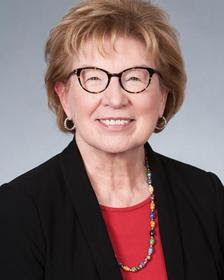Mary Anne Harvey, Executive Director of Disability Law Colorado discusses Educational Advocacy with Catherine Strode
Educational Advocacy is Passion for Disability Law Executive

Mary Anne Harvey began her career as a teacher in a Wyoming child care center. That work experience introduced her to children with disabilities and spawned an advocacy passion that has never left her. In the 1970’s, she began her work at what was formerly called ‘The Legal Center for People With Disabilities and Older People.’ At that time, the organization was tasked with implementing changes in the law governing special education.
Now Executive Director of Disability Law Colorado, Mary Anne says although the organization’s name has changed, its mission and its advocacy issues have not. In an interview with Catherine Strode, she says protecting children with disabilities in the educational system remains one of its ongoing advocacy efforts.
Where do you see challenges with disability law in Colorado in education?
“We‘ve come a very long way in special education. The leadership we have had in the state has brought more inclusion of children with disabilities in public schools. I think that has been a major achievement. I do see some issues recurring. We’re very distressed to see cases of seclusion and restraint in children in special education coming into the office. With the state of the art in terms of teaching and handling behavioral problems, there really shouldn’t be a need to restrain and seclude children. There are lots of other ways to manage behavior. The presence of school resource officers in the schools certainly changes the educational environment. I don’t know that is always handled very well because I think sometimes those security people respond to behavior differently than teachers and educators do. We worry that sometimes those responses end up putting children into the criminal justice system rather than staying in the educational realm. Some of those things are very concerning.”
Has there been an increase in complaints?
“We’ve seen an increase in complaints coming to us. It’s not unique to Colorado. The US Department of Education has a lot of data, by state. Our national association did a report a few years back on this issue. There has been federal legislation introduced called “Keeping All Students Safe” (Act). I did see some statistics recently that did indicate that younger children were being restrained more frequently. It’s been a national issue. We are trying to get our hands on the school district data to have a better understanding of how often this really does happen in the schools. It’s been at least seven years ago when we first started getting these complaints from parents, primarily that their children were being secluded or restrained. We were surprised because we hadn’t been getting a lot of complaints about it before.”
How can we ensure children’s’ protective rights are being enforced?
“The problem with the enforcement is that teachers don’t have the training. If they are trained as a regular education teacher, and they end up having some other children in their classroom, they may not have the training to be an effective teacher for that child. They don’t know the law around seclusion and restraint. I think we need to make sure every generation of teachers gets the kind of training it needs. The teachers don’t get training about behavioral management in their educational programs sometimes. It’s not new but it’s not being taught consistently in curricula. After we have been into a school district and had investigations, they invite us in to do training. They use behavior management consultants. We ask them to do that. We do a lot of training with school districts so that people really do understand the law and understand there are other ways to manage behavior.”
Do you see the need for state legislation in this area of disability law?
“There’s not an enforcement mechanism for the seclusion and restraint law in Colorado. If a child is secluded and restrained, there is a reporting requirement that school districts create a report about seclusion and restraint. There are no resources at the Department of Education to take that information, analyze it, and do anything with it in particular. We have a project to look at that data. Most of the school districts in the state have voluntarily reported to us. In response to that, we do training about the law and recommend that teachers get additional training about managing behavior in schools. It would be very nice if school districts were really required to report that information.”
Is there any movement to initiate legislation to mandate reporting?
“No. We looked at it a while back and we’ve had some discussion about it. We have so many other issues coming down the pike this legislative session, not this year.”
 Catherine Strode is Advocacy Denver’s Communications and Policy Specialist. She holds a Masters degree in Public Administration with an emphasis in Health Care Policy. Catherine publishes Policy Perspective, featuring interviews with state policy makers on issues that affect the work and mission of Advocacy Denver.
Catherine Strode is Advocacy Denver’s Communications and Policy Specialist. She holds a Masters degree in Public Administration with an emphasis in Health Care Policy. Catherine publishes Policy Perspective, featuring interviews with state policy makers on issues that affect the work and mission of Advocacy Denver.
